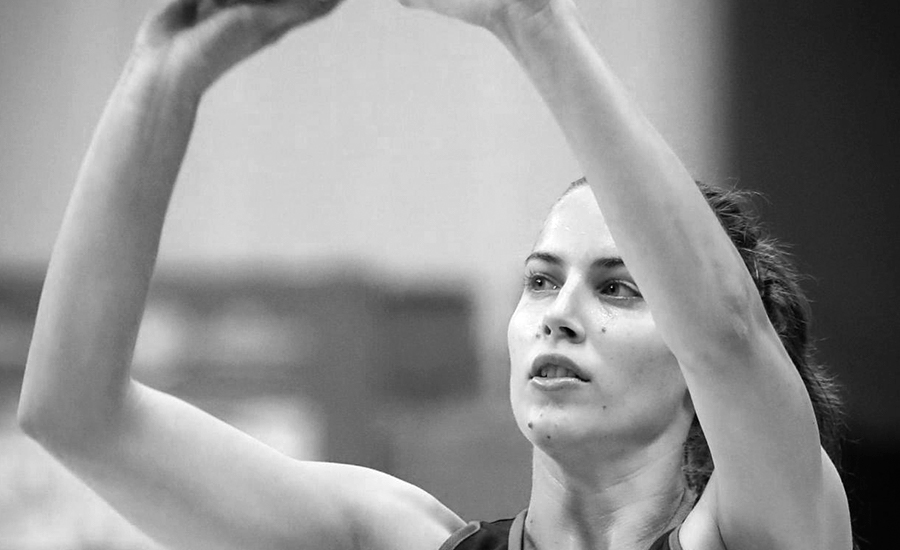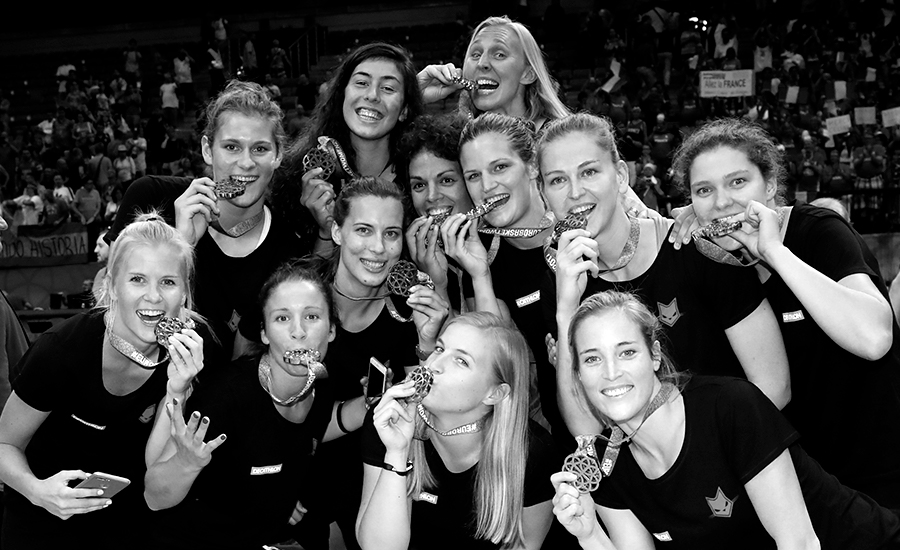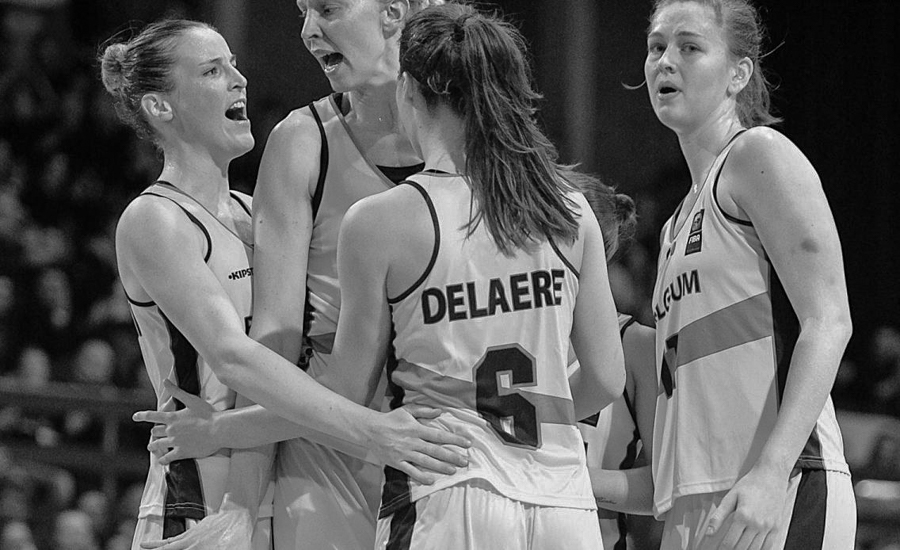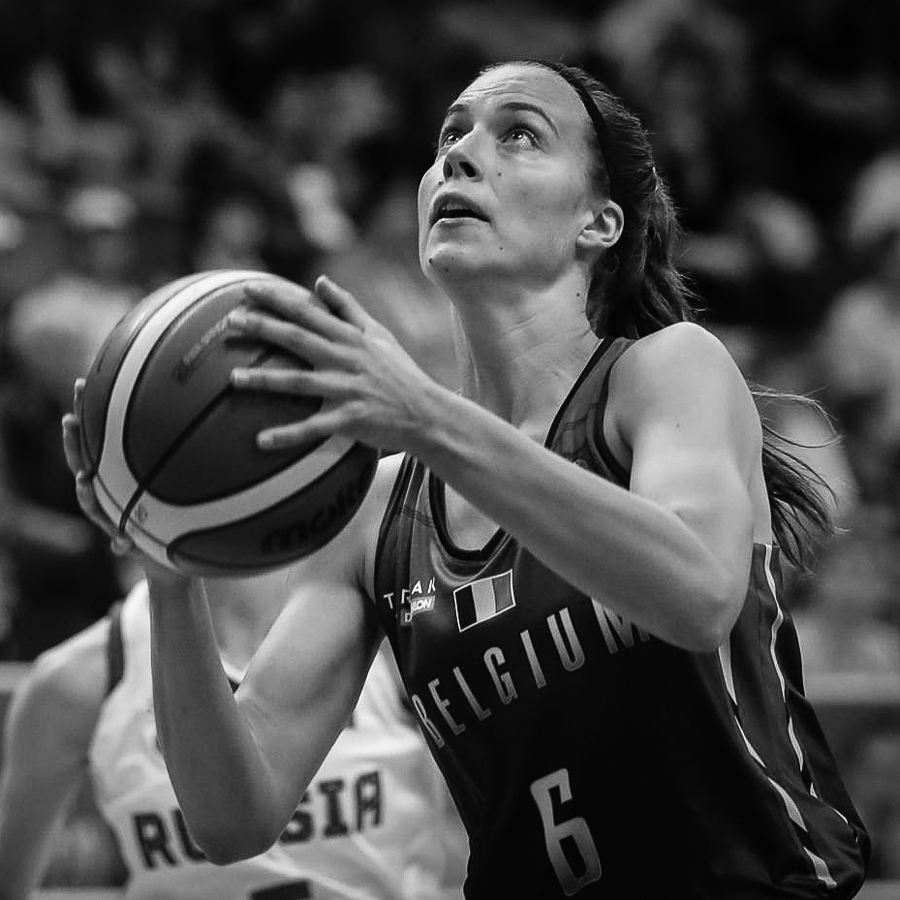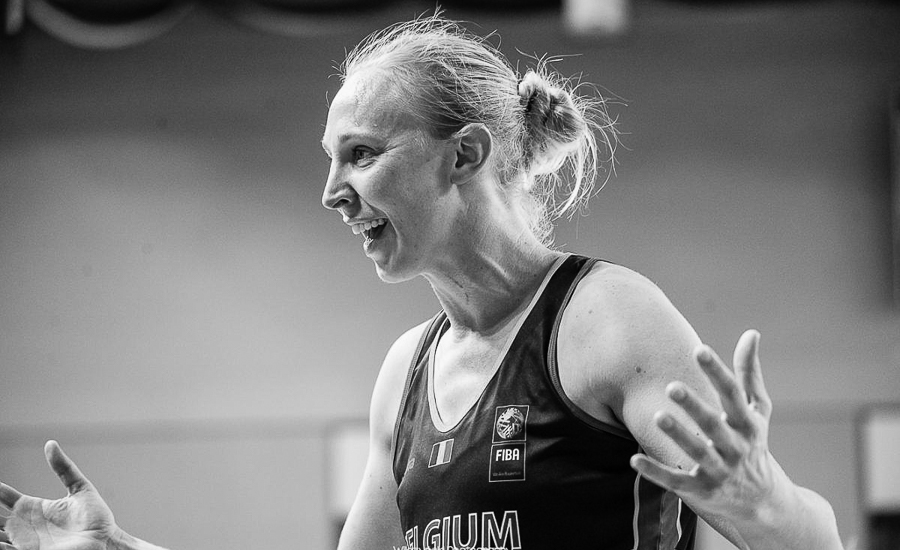Before the EC
It is one month before the historic race for bronze at the European Championship. After the Belgian Cats’ difficult victory over Slovakia (60-52), we meet up with living legend Ann Wauters and a rising star on the Belgian basketball firmament, player of the year Antonia Delaere. Wauters sat out the match in the stands, recovering from a groin injury (she has since re-joined the team). 22-year-old Delaere did work up a sweat, but in spite of the victory, she immediately displays her critical take on herself and the team.
Antonia: “I did not play too well today. In the beginning in particular, I was too doubtful and did not put my all into my attempts. Collectively, we were better than yesterday, but there is a lot of work still to be done, both in terms of offense and defence.”
Ann: “Well, I think this is a young team, and I’m not sure how they will deal with the pressure of such a big tournament. It’s not a good idea to start advertising our ambitions like that. But then again, things can progress very quickly. If you’re able to find one another out there on the court and win a game, that bolsters your confidence and allows you to grow throughout the tournament. There are no huge differences between levels the way that those exist in men’s basketball, so those things can happen. There are always surprises at European championships, and I suppose we are hoping to be one of those surprises. So we are going to go to Prague feeling ambitious, but without putting too much pressure on it.”
Antonia: “Anything can happen in our pool. We need to view every game as though it is the finals, and give each our all, and we’ll see what happens when we do. Like Ann says, this is the first European championship for most of us, so we’ll have to wait and see how we respond to the situation. All of us are definitely looking forward to it a great deal though.”
I need a coach who pushes me
A successful European championship could be a nice conclusion to a beautiful season for the both of you. Antonia, you won the title and the cup with Castors Braine and became player of the year. After a season like that, many players would try to find a position abroad. And yet, you signed on for another season. Why?
Antonia: “Because I feel good about our current Braine coach (Ainars Zvirzdins, red.). He has taught me a lot in every way; technically, tactically, defensively, offensively… He is very detailed, and he pushes me really hard. There were times where he benched me if I didn’t take action enough. That helped me realise that I have to dare to take those shots. I need a coach like that.”
Career plans
Antonia: “The Belgian league is… (pauses, choosing her words carefully) It’s not easy for me to be motivated for every single game. That is why it is good for us to have the Euroleague next season, in which we will be playing 14 games minimum, at a very high level. It will allow me to learn a lot.”
What’s next? Do you have a career plan in mind?
Antonia: “If things keep going well, the way they have been so far, I will stay in Belgium for one more season. After that, I want to go abroad and become a regular in the Euroleague.”
Ann: “If Antonia continues to play as she has been doing, she will have plenty of opportunities to go abroad. She was incredibly talented even as a youth player, but then experienced a setback, in the shape of a bad injury. She handled that injury really well, which says a lot about her character. You need character to be a professional athlete. It’s not just about the physical side of things, but also about your state of mind. I think she will always remember the way she has had to fight to come back. That experience is very important for the rest of her career. She is doing really well nowadays; step by step, not hurrying through anything. She has achieved a great personal title, player of the year, a reward for all of her hard work. She will only grow from here. Right now, Castors Braine is the perfect spot for her. It is a very professional team. We know the Belgian league is not the best, but the Euroleague is going to be a challenge.”
Share experience in a new team
Ann, after an impressive career, you will be retiring to work for Atticus. Have you honed in on when that will be?
Ann: “(laughs) No… It would be better for me not to say anything about that! I’ve come back on that decision a few times already, and I’m usually not like that. Apparently, I’m having a hard time putting an end to my career. I guess I haven’t tired of the game just yet. I enjoy it way too much. In Turkey, I felt great while we were out on the court. I played two finals, although we lost both. And I thought, why not join the team that beat me (Yakin Dogu, red.). They are doing something really cool. They are a relatively new team from Istanbul and will be playing in the Euroleague for the first time next year. They won three titles that year, so the bar has been raised. I am glad to be part of a team that is able to compete for all sorts of titles once again. Our ambition will be to be a part of the final four in the Euroleague by next season. I am definitely still up for that. I will probably be playing a different role though. There will be a lot of players, so less time for me on the court. I will have to share my experience, which will be a new challenge in and of itself.”
“I love the Atticus approach. We want to do more for athletes than just be the one to manage their employment contract. And so we should. There is a lot more to it than that.”
Ann Wauters on her future role as an agent
Joining the Atticus team
Explain to me what your role at Atticus is going to be?
Ann: “Oh, we haven’t even finalised that yet. I’m thinking of a more advisory capacity, like I have been doing for Antonia and a number of other players. I love the Atticus approach. They want to do more for athletes than just be the one to manage their employment contract. And so they should. There is a lot more to it than that. I think I have the necessary experience to be able to support players. I’m still very passionate about this sport and I might still play a part on the court as well, maybe as personal coach. I don’t have a set plan right now, but I’m sure things will work out naturally. What’s great is that I’ll be part of a team within Atticus, and I might even get involved in other sports eventually. I’m excited about that.”
You know every detail of Antonia’s playing. What could she improve upon?
Ann: “I think she has to dare to take even more initiative while on the offense. She has to aggressively move towards the basket. The Belgian national team has plenty of good shooters, but we need someone like Antonia who is able to move towards the basket. She can be very good at that. And I also think she is very good when she does not have the ball. She moves really well. She does not have to have control of the ball in order to take action. She needs to keep working on that. We will need her a lot on defence as well. She is one of the most athletic guards in the national team. She has to always be at the ready to stop some of the better players in the opposing team. And in terms of technical skills, she could stand to improve her jump shot in the drive. But she already knows all of this.”
Long-term approach
Antonia: “That’s true. I have to focus more on my defensive duties in the future. I consider that to be a great motivator. And in terms of offence, I need to doubt less and really attack the basket.”
You have mentioned experiencing doubt while out on the court a few times now. What do you think you can do about that?
Antonia: ”It helps for me to do a little clapping game with the team psychologist. And also, I need a coach that is tough on me. Although in the end, I have to be the one to do it, of course.”
Ann, you have had a very impressive career. Are there aspects in terms of the support you have received that could have been improved upon?
Ann: “I have been lucky enough to always be a part of good teams that were able to compete for titles. However, the individual support could have been better. But then again, my career was so hectic, moving from one season straight to the next, so I didn’t really have time for any of that. Though I wouldn’t have wanted it any other way.”
What do you feel is important when managing a professional athlete?
Antonia: “For me, one of the important things is the bond I have with Julie (Rumes, red.). I feel really good about her. Whenever I need her, she shows up for me within the hour. She is very motivated to help me. Whenever I have a question that needs answering, she responds right away. This season, it was looking like I was going to have to share an apartment with another player for a while, but Julie took care of that. These might seem like small matters, but they are crucial ones for you to be able to feel good as an athlete. That sense of trust is very important to me.”
Ann: “That is the most important thing, that bond of trust. Atticus aims to build long-term relationships, involving a lot of trust. The management team has to want what’s best for the player. That requires effort, because you have to know your player to see what’s best for them. A good manager will know what kind of situation will help a particular athlete feel best. Not just financially: it is more about how they feel on and off the court. Yes, the financial side of things is part of it; it would be foolish to pretend that we aren’t interested in making money. But imagine this; you are making lots of money, but you don’t feel right. You will most likely play poorly that season, and so your subsequent contract will be worse. That is why it is important for Atticus to take a long-term approach, hopefully enabling us to support players like Antonia throughout their entire careers.”
Message to the federations
How can the support of young talents in Belgium be improved?
Antonia: “I went to an athletes’ secondary school, and then suddenly when I graduated, my support system was gone. I had to find my own way after that. There are so many things you don’t know anything about at that point: signing contracts, being approached by agents… A new world was opening itself up to me, and I was way out of my depth.”
Ann: “That’s an excellent point. A lot of players are not yet ready to start playing professionally when they turn 18. That requires proper support. And there aren’t enough professional women’s teams in Belgium. Braine and Namen are the only ones. The other teams in the top five are semi-professional. Things would be a lot more interesting if the league was stronger. That is why it is so important for us to invest in supporting young players.”
A recurrent theme on this blog is the following: how do we foster more new talent?
Ann: “I have three young children myself. We have to offer children at the elementary school level many different types of sports, instead of pigeonholing them into a single branch of sport right away. It is important for children to be active, to be flexible, and to have gotten a taste of many different things. I am directing this at the federations, because they all want as many members as possible. At a later stage, we have to keep in mind that the athletes are still young and that we should not burn them out so fast. Sometimes, youngsters who are in athletes’ secondary school are in two or three campaigns each summer. That is too much. They have to still be up for it when their career really starts, after they graduate. I don’t feel like such early talent detection and specific support is helpful, probably because I started playing basketball at a very late age. There were no athletes’ secondary schools at the time. I think it’s a better idea to put that money into better support for trainers, so that the basics are covered properly. The talented youngsters will appear, no worries; we will be able to find them either way.”


